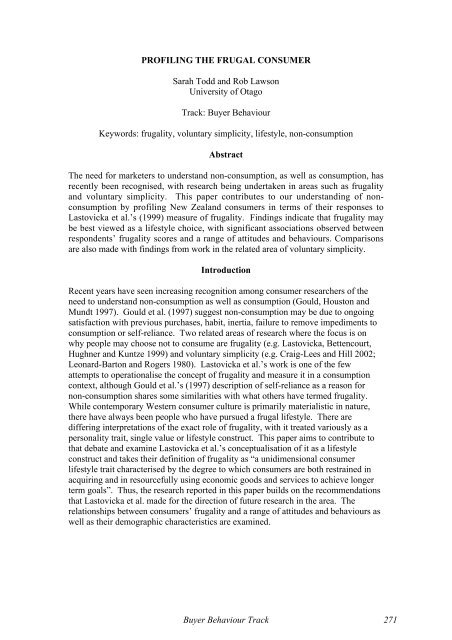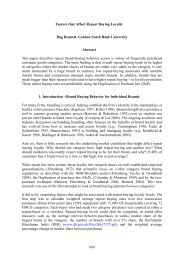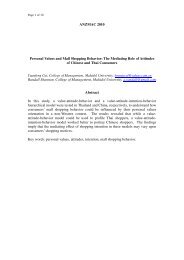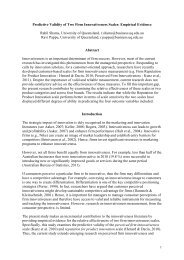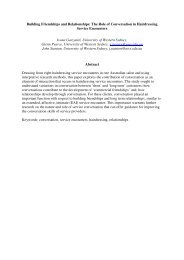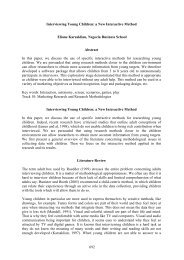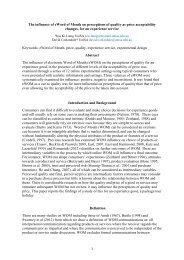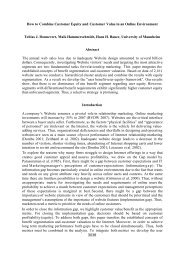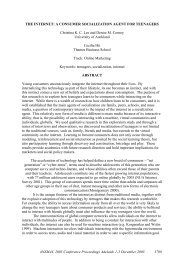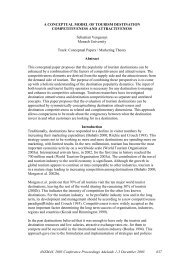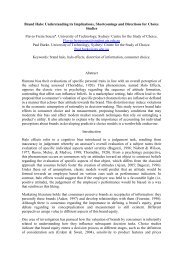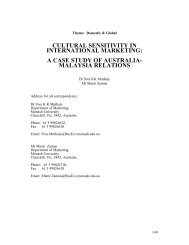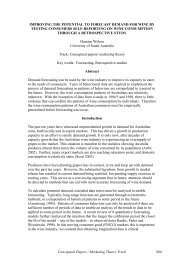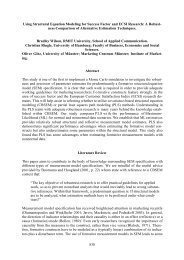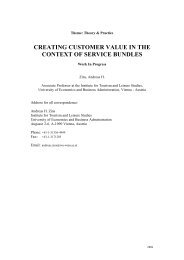PROFILING THE FRUGAL CONSUMER Sarah Todd and ... - ANZMAC
PROFILING THE FRUGAL CONSUMER Sarah Todd and ... - ANZMAC
PROFILING THE FRUGAL CONSUMER Sarah Todd and ... - ANZMAC
Create successful ePaper yourself
Turn your PDF publications into a flip-book with our unique Google optimized e-Paper software.
<strong>PROFILING</strong> <strong>THE</strong> <strong>FRUGAL</strong> <strong>CONSUMER</strong><br />
<strong>Sarah</strong> <strong>Todd</strong> <strong>and</strong> Rob Lawson<br />
University of Otago<br />
Track: Buyer Behaviour<br />
Keywords: frugality, voluntary simplicity, lifestyle, non-consumption<br />
Abstract<br />
The need for marketers to underst<strong>and</strong> non-consumption, as well as consumption, has<br />
recently been recognised, with research being undertaken in areas such as frugality<br />
<strong>and</strong> voluntary simplicity. This paper contributes to our underst<strong>and</strong>ing of nonconsumption<br />
by profiling New Zeal<strong>and</strong> consumers in terms of their responses to<br />
Lastovicka et al.’s (1999) measure of frugality. Findings indicate that frugality may<br />
be best viewed as a lifestyle choice, with significant associations observed between<br />
respondents’ frugality scores <strong>and</strong> a range of attitudes <strong>and</strong> behaviours. Comparisons<br />
are also made with findings from work in the related area of voluntary simplicity.<br />
Introduction<br />
Recent years have seen increasing recognition among consumer researchers of the<br />
need to underst<strong>and</strong> non-consumption as well as consumption (Gould, Houston <strong>and</strong><br />
Mundt 1997). Gould et al. (1997) suggest non-consumption may be due to ongoing<br />
satisfaction with previous purchases, habit, inertia, failure to remove impediments to<br />
consumption or self-reliance. Two related areas of research where the focus is on<br />
why people may choose not to consume are frugality (e.g. Lastovicka, Bettencourt,<br />
Hughner <strong>and</strong> Kuntze 1999) <strong>and</strong> voluntary simplicity (e.g. Craig-Lees <strong>and</strong> Hill 2002;<br />
Leonard-Barton <strong>and</strong> Rogers 1980). Lastovicka et al.’s work is one of the few<br />
attempts to operationalise the concept of frugality <strong>and</strong> measure it in a consumption<br />
context, although Gould et al.’s (1997) description of self-reliance as a reason for<br />
non-consumption shares some similarities with what others have termed frugality.<br />
While contemporary Western consumer culture is primarily materialistic in nature,<br />
there have always been people who have pursued a frugal lifestyle. There are<br />
differing interpretations of the exact role of frugality, with it treated variously as a<br />
personality trait, single value or lifestyle construct. This paper aims to contribute to<br />
that debate <strong>and</strong> examine Lastovicka et al.’s conceptualisation of it as a lifestyle<br />
construct <strong>and</strong> takes their definition of frugality as “a unidimensional consumer<br />
lifestyle trait characterised by the degree to which consumers are both restrained in<br />
acquiring <strong>and</strong> in resourcefully using economic goods <strong>and</strong> services to achieve longer<br />
term goals”. Thus, the research reported in this paper builds on the recommendations<br />
that Lastovicka et al. made for the direction of future research in the area. The<br />
relationships between consumers’ frugality <strong>and</strong> a range of attitudes <strong>and</strong> behaviours as<br />
well as their demographic characteristics are examined.<br />
Buyer Behaviour Track 271
Background<br />
Despite limited attention from social scientists in general as well as marketing<br />
academics, frugality has long been associated with various individuals, social groups<br />
<strong>and</strong> religions. A number of perspectives on the concept are identifiable, ranging from<br />
the religious to that of ‘self-help’. The latter in particular holds some relevance for<br />
consumer researchers, in that it suggests consumers will only achieve long-term goals<br />
through the denial of short term desires <strong>and</strong> the careful use of resources. Key<br />
publications in this area tend to treat frugality as a lifestyle <strong>and</strong> offer tips on<br />
consuming wisely (e.g. Dacyczyn 1992, 1995, 1997 cited Lastovicka et al. 1999).<br />
Psychologists define frugality in a similar way (e.g. DeYoung 1986), although their<br />
perspective is that it is a personality trait, rather than a lifestyle. Various religions<br />
have long preached against giving in to materialist desires, for example Calvinism in<br />
the 1500s advocated frugality as a path to salvation, <strong>and</strong> thus frugality can be treated<br />
as a value.<br />
A related area, but one that appears to have developed in parallel rather than jointly, is<br />
that of voluntary simplicity (VS). As with frugality, VS is not a new concept, with<br />
the term having first been coined by Gregg (1936). Voluntary simplicity is generally<br />
defined as “both a system of beliefs <strong>and</strong> practice, …centred on the idea that personal<br />
satisfaction, personal fulfilment <strong>and</strong> happiness result from a commitment to the<br />
nonmaterial aspects of life” (Zavestoski 2002:149). While marketing practitioners<br />
have responded to the apparent increase in people choosing the VS lifestyle by urging<br />
consumers to “buy what they really want” (rather than necessarily consuming less),<br />
researchers in the area have been quick to point out that VS is a choice rather than<br />
enforced non-consumption for reasons such as poverty (e.g. Craig-Lees <strong>and</strong> Hill<br />
2002; Zavestoski 2002). That is, rather than appealing to tightwads or those wanting<br />
to save the environment, VS is said instead to be a re-prioritising <strong>and</strong> reflect the<br />
“authentic self” or the “individuality of simplicity” (Kilbourne 1992:161).<br />
Recent work has focused on underst<strong>and</strong>ing VS as a way of life <strong>and</strong> describing those<br />
consumers who choose the VS lifestyle, as one of the criticisms of writings in the area<br />
is that most are based on conjecture, with little “substantial investigation into<br />
individuals who voluntarily choose to live with less” (Craig-Lees <strong>and</strong> Hill 2002:188).<br />
One reason for the limited empirical research of those who choose the VS lifestyle<br />
may be due to the problems with operationally defining what is meant by VS.<br />
Attempts to develop measurement scales in the 1980s (e.g. Leonard-Barton 1981;<br />
Sharma <strong>and</strong> Wisenblit 1984; Sharma 1985) emphasised ecological values, despite<br />
recognition that the VS concept is wider than a desire to protect the environment.<br />
Behaviours measured included composting <strong>and</strong> recycling behaviour, second-h<strong>and</strong><br />
purchasing <strong>and</strong> growing vegetables. At a similar time to the publication of<br />
Lastovicka et al.’s frugality measure, Iwata (1997, 1999) proposed a broader scale for<br />
measuring VS which included reference to impulse purchasing, materialism <strong>and</strong><br />
desire for simple or complex products.<br />
In their recent study of Australian VS lifestylers, Craig- Lees <strong>and</strong> Hill (2002) moved<br />
from attempts at scale development <strong>and</strong> took a qualitative approach, arguing that there<br />
was still a need for exploratory research in the area. Their sample selection was based<br />
on age (more of those who adopt the VS lifestyle seem to be baby boomers),<br />
<strong>ANZMAC</strong> 2003 Conference Proceedings Adelaide 1-3 December 2003 272
educational qualifications <strong>and</strong> income (previous literature having suggested that those<br />
choosing this life have the ability to earn a high income <strong>and</strong> are well educated.)<br />
Findings to emerge from their discourse analysis provide a rich picture of simplifiers<br />
in comparison to non-simplifiers. Focusing on consumption-related findings,<br />
simplifiers were more concerned with the functionality of utility items <strong>and</strong> br<strong>and</strong>ing<br />
<strong>and</strong> fashion were indicators more of monetary value as opposed to status.<br />
Consumption was consciously reduced in discretionary areas such as eating out,<br />
theatres/movies <strong>and</strong> travel. Books, music <strong>and</strong> visits to art galleries/museums were not<br />
seen as luxuries. With regards financial behaviour, fewer of the VS sample had<br />
investment portfolios or their own homes <strong>and</strong> financial security did not seem to be a<br />
concern. Perhaps reflecting the problems that have been experienced in developing a<br />
quantitative measure of this lifestyle choice, the VS group itself comprised of three<br />
smaller groups in terms of motivation, namely environmentalists, spiritualists <strong>and</strong> the<br />
self-oriented.<br />
Despite the obvious commonalities, frugality <strong>and</strong> voluntary simplicity have their own<br />
streams of literature that don’t appear to cross-reference each other. The distinction<br />
between the two is not immediately clear, although those working in the area of VS<br />
have apparently been quicker to accept it as a lifestyle choice, while frugality’s role is<br />
less well-defined. One difference is the emphasis on non-consumption, with writings<br />
on frugality seeing non- or deferred consumption as a way to achieving long-term<br />
goals, while VS is portrayed more as an end in itself, rather than as a means to an end.<br />
The objective of this paper then is to profile frugal <strong>and</strong> non-frugal consumers across a<br />
variety of aspects of their lifestyles <strong>and</strong> examine further the suggestion that frugality,<br />
as with VS, is best viewed as a lifestyle choice. In this way, the research reported<br />
here builds on Lastovicka et al’s (1999) work in developing a scale for measuring<br />
frugality <strong>and</strong> specifically tests some of the propositions to emerge from their study<br />
regarding the association between frugality <strong>and</strong> a number of demographic <strong>and</strong><br />
lifestyle characteristics. Additionally, by profiling frugal consumers, it enables some<br />
comparisons to be made with profiles of those who adopt the VS lifestyle.<br />
Methodology & Findings<br />
The opportunity arose to include Lastovicka et al.’s (1999) measure of frugality (see<br />
Appendix for items) in a nationwide survey of New Zeal<strong>and</strong>ers’ consumption<br />
lifestyles. A mail questionnaire was sent out to 10 000 New Zeal<strong>and</strong>ers, with an<br />
effective response rate of 38% obtained. The resulting sample was checked against<br />
census statistics, which indicated that the sample was generally representative of the<br />
greater NZ population, although there was a slight under-representation of those over<br />
65years. A check for non-response bias was also undertaken <strong>and</strong> no significant<br />
differences were noted in responses. In addition to the items for Lastovicka et al.’s<br />
scale, a range of attitudes <strong>and</strong> behaviours were measured, as well as conventional<br />
demographic <strong>and</strong> socio-economic variables being included.<br />
Analysis was initially undertaken to test the reliability of Lavstovicka et al.’s eight<br />
item measure of frugality. A Cronbach alpha of 0.76 (2dp) was obtained, indicating<br />
moderate internal reliability for the scale <strong>and</strong> this was considered adequate for further<br />
analysis to be undertaken. Actual scores on the frugality index ranged from 9 to 40,<br />
with a median value of 29. The 10% of the sample scoring 29 were removed to<br />
Buyer Behaviour Track 273
enable comparisons to be made between those with lower (42%) <strong>and</strong> higher (48%)<br />
levels of frugality. This method of performing a median split to examine contrasting<br />
groups is an accepted method that has been employed in many pieces of consumer<br />
research (e.g. Lawson, <strong>Todd</strong> <strong>and</strong> Boshoff 2001; Feick <strong>and</strong> Price 1987; <strong>Todd</strong> &<br />
Lawson 2002) <strong>and</strong> also has an advantage in that it avoids assuming potential linearity<br />
in relationships that is implicit in other tests such as ordinary correlation <strong>and</strong><br />
regression.<br />
Associations between the level of frugality <strong>and</strong> a number of demographic, socioeconomic,<br />
behavioural <strong>and</strong> attitudinal variables were then examined. Table 1<br />
provides a summary of all the significant associations observed (p=0.000).<br />
Discussion <strong>and</strong> Conclusions<br />
In their seminal article on the measurement of frugality, Lastovicka et al. (1999)<br />
proposed that future research should examine frugality both as a dependent <strong>and</strong> as an<br />
independent variable. Discussing firstly its role as a dependent variable, they note<br />
their failure to find a relationship between either frugality <strong>and</strong> age or frugality <strong>and</strong><br />
income. Admitting themselves that this seemed somewhat counterintuitive, they<br />
recommended this as an aspect that required further investigation. Looking at the<br />
findings from our nationally representative sample, it is evident that a significant<br />
relationship was found between age <strong>and</strong> frugality, although this is not linear in that<br />
those aged between 25 <strong>and</strong> 29 years were actually even less frugal than their younger<br />
counterparts (aged 18 to 24yrs.) Other than that exception though, the general<br />
conclusion to be made from our research is that frugality is positively correlated with<br />
age. It is difficult to compare this with findings in the VS area (such as those of<br />
Craig-Lees <strong>and</strong> Hill 2002) because<br />
<strong>ANZMAC</strong> 2003 Conference Proceedings Adelaide 1-3 December 2003 274
Demographically, frugal consumers are<br />
more likely to be…<br />
Older (least frugal are between 25 <strong>and</strong><br />
29yrs); Widowed, divorced or separated;<br />
Full-time homemakers or retired;<br />
Churchgoers; Unskilled<br />
Environmentally, frugal consumers are<br />
more likely to…<br />
Hold positive attitudes towards alternative<br />
forms of transport & public transport;<br />
Recycle regularly<br />
Frugal consumers are more likely to eat…<br />
Roast meals; Cooked breakfasts; Brown<br />
bread; Do home baking<br />
And less likely to eat…<br />
Fresh fruit; Salted nuts, potato chips,<br />
chewing gum & chocolate bars; Pre-prepared<br />
stir fries, cooking sauces; Continental style<br />
cheeses; Takeaways; Meals at<br />
cafes/restaurants; Drink wine, beer & soft<br />
drinks<br />
Frugal consumers are more likely to own<br />
or be interested in owning….<br />
Caravans; Musical instruments; Rice<br />
cookers; Electric woks; Electric frypans;<br />
Dehumidifiers; Popcorn makers;<br />
And less likely to own/be interested in<br />
owning…<br />
CD players; Car CD players; Auto clothes<br />
driers; Mountain bikes; Dishwashers; Video<br />
players; 2 nd tv sets; Mobile phones; Internet<br />
connections; DVD players<br />
Table 1: A profile of the frugal<br />
Financially, frugal consumers are more<br />
likely to have…<br />
Savings accounts; Family trusts; Shares; Own<br />
home debt free<br />
And less likely to use…<br />
Credit cards; Cash; Hire purchase; Retail<br />
charge cards; Medical insurance; Own real<br />
estate in addition to own home<br />
Frugal consumers are more likely to…<br />
Undertake home renovations/DIY; Work in<br />
their garden; Have a vegetable garden; Do<br />
community or volunteer work; Participate in<br />
church activities; Give to charities; Do arts &<br />
crafts & knitting; Write a letter; Go to the<br />
library; Play a musical instrument; Listen to<br />
classical/chamber & country/folk music; Go<br />
to art galleries/ museums; Take more<br />
holidays<br />
And less likely to…<br />
Dine out as a family; Surf the internet; Buy<br />
on the internet; Buy CDs & magazines;<br />
Gamble; Send a text message; Play computer<br />
games; Go to the movies; Play golf; Go to<br />
aerobics; Exercise to keep fit or lose weight;<br />
Fly domestically or internationally<br />
Frugal consumers are also more likely<br />
to…<br />
Support government spending in a range of<br />
areas; Donate to Plunket & the National<br />
Heart Foundation (rather than the SPCA or<br />
Starship Children’s Hospital); Shop for<br />
‘specials’; Think too much sex is used to sell<br />
things<br />
Frugal consumers are more likely to<br />
describe themselves as….<br />
Do-it-yourselfers; Striving to get the better<br />
things in life; Loyal to particular br<strong>and</strong>s &<br />
shops<br />
no study has included a comprehensive range of ages. However, the literature does<br />
suggest that VS is a phenomenon associated with those from the baby boomer cohort.<br />
Our findings regarding income are consistent with those of Lastovicka et al. (1999) in<br />
that only a very weak relationship was found between income <strong>and</strong> frugality. Results<br />
were mixed regarding the direction of that relationship, although frugality was high<br />
among a group of higher income New Zeal<strong>and</strong>ers. This is congruent with work in the<br />
VS area, which postulates those who opt for the VS lifestyle are in fact financially<br />
capable of consuming at a higher level but consciously choose not to. No relationship<br />
was observed between level of education <strong>and</strong> frugality, which is not consistent with<br />
the VS literature, where a high level of education has been postulated as being<br />
positively associated with the choice of a VS lifestyle. Other associations observed<br />
regarding frugality as a dependent variable indicate that living frugally requires a<br />
Buyer Behaviour Track 275
certain amount of time, in that it is stronger amongst those who indicate they are not<br />
employed outside the home. As mentioned in the review of related literature,<br />
frugality has been associated with various religions over many years, <strong>and</strong> it is thus<br />
perhaps not surprising to note that frugality is positively associated with church<br />
membership.<br />
With regards frugality as an independent variable, Table 1 shows that frugal<br />
consumers differ from their non-frugal consumers in a number of aspects of their<br />
lives. Some of the results of this study clearly parallel those of Craig-Lees <strong>and</strong> Hill’s<br />
(2002) study of ‘simplifiers’. For example, visits to art galleries/museums <strong>and</strong><br />
ownership of musical instruments were significantly higher among the more frugal.<br />
That no significant differences were noted between the frugal <strong>and</strong> non-frugal with<br />
regards buying or reading books is also consistent with Craig-Lees <strong>and</strong> Hill in that<br />
they are clearly not perceived as ‘luxury’ items that can be done without, unlike<br />
magazines which were much less likely to be purchased by frugal consumers.<br />
Consistent also with Craig-Lees <strong>and</strong> Hill is the finding that those scoring highly on<br />
the frugality measure were less likely to participate in activities such as dining out <strong>and</strong><br />
going to the movies. Frugal consumers in our study indicate they take more holidays<br />
but these holidays seem more likely to be at relatively close destinations, with fewer<br />
indicating that they flew either domestically or internationally. Travel was one of the<br />
areas where Craig-Lees <strong>and</strong> Hill (2002) found simplifiers tended to cut expenditure.<br />
Our results regarding br<strong>and</strong>s <strong>and</strong> loyalty are mixed, with frugal consumers indicating<br />
they shop a lot for specials but, at the same time, are loyal to particular br<strong>and</strong>s <strong>and</strong><br />
shops. Without further probing, it is difficult to know whether that loyalty is due to<br />
perceived value for money. In terms of payment, this study picks up on Lastovicka et<br />
al.’s suggestion that frugality may act as an independent variable determining<br />
different payment preferences. Results clearly indicate a disinclination to use any<br />
form of card or credit payment option. Food consumption is another area where the<br />
frugal <strong>and</strong> non-frugal differ significantly. It is evident that convenience is a low<br />
priority with the frugal (confirming the earlier suggestion that being frugal takes time)<br />
<strong>and</strong>, as Craig-Lees <strong>and</strong> Hill found in their VS study, food appears to fall into the<br />
‘luxury’ category. With reference to Iwata’s (1997, 1999) efforts to develop a<br />
measure of VS, vegetable gardening was positively associated with frugality.<br />
While frugal consumers did indicate higher levels of ‘environmentally friendliness’<br />
(e.g. recycling <strong>and</strong> attitudes towards alternative forms of transport), this was only one<br />
of many areas where they differed from their non-frugal counterparts, confirming the<br />
thoughts of those in the VS area that have stressed ecological values are only one of<br />
the motivations that drive the choice to opt for the VS lifestyle.<br />
Overall, the broad range of areas where relationships were found with frugality gives<br />
support to Lastovicka et al.’s contention that it is a lifestyle trait. Parallels found with<br />
the limited empirical findings published regarding voluntary simplicity also suggest<br />
that further work is needed to look at both the commonalities <strong>and</strong> the differences in<br />
these two constructs. The area of non-consumption is one that has been relatively<br />
neglected by consumer researchers <strong>and</strong> yet underst<strong>and</strong>ing reasons why people choose<br />
not to consume would seem just as important <strong>and</strong> enlightening as looking at what<br />
motivates people to consume.<br />
References<br />
<strong>ANZMAC</strong> 2003 Conference Proceedings Adelaide 1-3 December 2003 276
Craig-Lees, M. <strong>and</strong> Hill, C. 2002 Underst<strong>and</strong>ing voluntary simplifiers. Psychology<br />
<strong>and</strong> Marketing19(2):187-210.<br />
Fieck, L. <strong>and</strong> Price, L. 1987 The Market Maven: A Diffuser of Marketplace<br />
Information. Journal of Marketing 51:83-97.<br />
Gould, S., Houston, F. <strong>and</strong> Mundt, J. 1997 Failing to Try to Consume: A Reversal of<br />
the Usual Consumer Research Perspective. Advances in Consumer Research 24:211-<br />
2216.<br />
Gregg, R. 1936 Voluntary Simplicity. Visva-Bharati Quarterly. (reprinted in Manas,<br />
Sept.4 1974)<br />
Iwata, O. 1997 Attitudinal <strong>and</strong> behavioral correlates of voluntary simplicity lifestyles.<br />
Social Behavior 25:233-240.<br />
Iwata, O. 1999 Perceptual <strong>and</strong> behavioral correlates of voluntary simplicity lifestyles.<br />
Social Behavior <strong>and</strong> Personality 27:379-386.<br />
Kilbourne, W. 1992 On the Role of Critical Theory in Moving Toward Voluntary<br />
Simplicity. Meaning, Measure <strong>and</strong> Morality of Materialism 161-163.<br />
Lastovicka, J., Bettencourt, L., Hughner, R. <strong>and</strong> Kuntze, R. 1999 Lifestyle of the<br />
Tight <strong>and</strong> Frugal. Journal of Consumer Research 26:85-98.<br />
Lawson, R., <strong>Todd</strong>, S. <strong>and</strong> Boshoff, C. 2001 Relationships Between Consumer<br />
Sentiment Towards Marketing <strong>and</strong> Consumer Lifestyles.Australasian Marketing<br />
Journal 9(7):7-22.<br />
Leonard-Barton, D. <strong>and</strong> Rogers, E. 1980 Voluntary Simplicity. Advances in<br />
Consumer Research 7:28-34.<br />
Sharma, A. 1985 The voluntary simplicity consumer. Journal of Consumer Marketing<br />
2:57-64.<br />
Sharma, A. <strong>and</strong> Wisenblit, J. 1984 Values of voluntary simplicity: Lifestyle <strong>and</strong><br />
motivation. Psychological Reports 55:231-240.<br />
<strong>Todd</strong>, S. & Lawson, R. 2002 Values <strong>and</strong> frugality. Proceedings of the 31 st European<br />
Marketing Academy (EMAC) Conference, Braga, Portugal CD-Rom.<br />
Zavestoski, S. 2002 The social-psychological bases of anticonsumption attitudes.<br />
Psychology <strong>and</strong> Marketing 19(2):149-165.<br />
Appendix<br />
Measure of consumer frugality<br />
If you take good care of your possessions, you will definitely save money in the long<br />
run.<br />
There are many things that are normally thrown away that are still quite useful.<br />
Making better use of my resources makes me feel good.<br />
If you can re-use an item you already have, there’s no sense in buying something<br />
new.<br />
I believe in being careful how I spend my money.<br />
I discipline myself to get the most from my money.<br />
I am willing to wait on a purchase I want so that I can save money.<br />
There are things I resist buying today so I can save for tomorrow.<br />
Source: Lastovicka, J., Bettencourt, L., Hughner, R. & Kuntze, R., 1999. Lifestyle of the tight <strong>and</strong><br />
frugal: Theory <strong>and</strong> measurement. Journal of Consumer Research 26, 85-98.<br />
Buyer Behaviour Track 277


